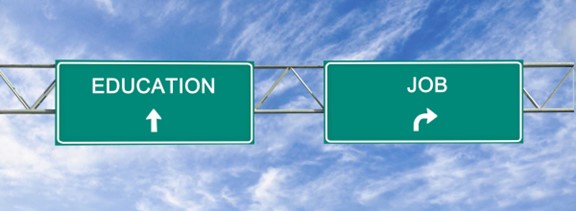Job vs higher education is probably one of the most difficult decisions you’ll ever make. It’s not just about what you want, but how much you’re willing to sacrifice for it.
On one hand, there’s nothing like being able to live out your passion every day by working in an industry that inspires you. On the other hand, there are many benefits to going back to school for a degree that will help you get ahead in your chosen field.
So how do you decide?
In this article we will be looking at the advantages of opting for a higher degree and going for a job and be answering the question does higher education lead to better jobs?
Why choose higher education before a job?
The following are the advantages of choosing higher education before a job:
1. Higher education leads to higher income
Of course, there are many factors that affect earnings potential beyond educational attainment. But it’s still clear that higher education leads to higher incomes. And that’s not just true for individuals; it also holds true for households. According to data from the Pew Research Center, households headed by someone with a Bachelor’s degree or more earned a median income of $100,093 in 2016. That’s nearly double the median income of households headed by someone with only a high school diploma ($49,785).
If you are asking yourself the question ‘does higher education lead to better jobs?’. The answer is yes. People with college degrees tend to have better job prospects and are more likely to be employed than those without degrees. They also tend to work in jobs that offer greater opportunities for advancement and pay more than jobs that don’t require a college degree.
The higher education equals higher income theory holds true for Asian people too. This means that it will hold true for India also. If you want a job with high salary, then higher education is the way to go.
2. Higher education leads to lower rates of unemployment
It is a fact that people with higher education levels tend to have lower unemployment rates. This is especially true for those who have a college degree or higher. There are two major reasons for this.
First, people with higher education levels tend to have better job prospects. They are more likely to be offered jobs that match their skills and qualifications. Even in tough economic times, employers are more likely to lay off employees with less education first.
Second, people with higher education levels tend to be more employable overall. They often have the skills and qualifications that employers value most highly. Additionally, they usually have a good work ethic and are able to adapt to changing workplaces easily.
This also makes higher education more attractive when it comes to education vs employment.
3. Higher education is important for your careers initially
Those who support studying say that a higher degree improves professional prospects. They argue that obtaining a job is hard and that qualifications determine employment. They also say that keeping a job and climbing the corporate ladder depend on productivity and experience, while acquiring the job depends on education.
Supporters of working argue that you can gain skills and experience through working which will improve your future prospects. However, those who support studying say that more education improves future preparedness. They argue that higher education prepares you for future skills, regardless of what field you end up working in.
Although this point can be debated but I would like to favor higher education in this regard. This single-handedly makes higher education much more attractive when it comes to jobs vs higher education.
4. Eliminates training period
In most cases, higher education eliminates the need for a training period. This is because higher education provides the skills and knowledge needed for most jobs. Therefore, employers do not need to provide on-the-job training for new employees who have a college degree. This saves employers time and money, which can be used to train other employees or invest in other areas of the business. Additionally, it allows employees to start working immediately after being hired, which can increase productivity and efficiency in the workplace.
This also rules in the favor of higher education when it comes to education vs employment.
Why should you opt for a job?
On the other hand, many people think that getting a job and gaining experience is much more important at this point in one’s life than going back to school.
Let us consider some of their arguments:
1. Degrees have nothing to do with the level of output
There is a common misconception that having a higher degree leads to better work quality. However, this is not always the case. In fact, research has shown that there is no correlation between educational attainment and job performance.
So why is this? One of the main reasons is that intelligence is not solely based on IQ scores. There are other important factors, such as emotional intelligence and social skills, which are just as important in predicting job performance.
Even if you don’t have a job with high salary at the beginning, it is still worth it.
2. Degrees will go irrelevant over time
In today’s ever-changing world, it’s hard to predict what skills will be in demand 10, 20, or even 50 years from now. Will your degree still be relevant?
Just think about how much has changed in the last 10 years alone. We’ve gone from flip phones to smartphones, MySpace to Facebook, physical books to ebooks. With technology evolving at such a rapid pace, it’s hard to know what new innovations will emerge in the next few decades and how they’ll impact the workforce. Many jobs that existed 10 or 20 years ago no longer exist today because they’ve been made obsolete by technology – and more jobs are likely to meet the same fate in the future.
This is also one of the key arguments in favor of a job when people are debating on job vs higher education.
So regardless of what degree you have, there’s always a risk that it could become irrelevant as technology continues to change the workplace.
3. Degrees take too long (and are too expensive) to complete
Pursuing higher studies can take anywhere from two to eight years (or more), depending on your chosen field of study. And with tuition costs continuing to rise, finishing a degree can be very costly. In contrast, you can usually enter the workforce relatively quickly after completing high school or college.
So, if you’re interested in starting your career sooner rather than later, going straight into the workforce is often a better option than pursuing higher studies. There is no point in falling in the debate of job vs higher education because you need money to survive.
Plus, once you’re working full-time, you can always continue learning new things through online courses, conferences, etc. – without having to spend several years (and lots of money) getting another degree first.
Conclusion
In conclusion, I hope this guide has been helpful in providing you with some information about the pros and cons of pursuing higher education vs employment. While there are many factors to consider when making this decision, it is important to remember that the best choice for you may not be the same as the best choice for someone else.
If you’re still unsure of which path is right for you, consider consulting with a career counsellor who can help guide you in the right direction.










